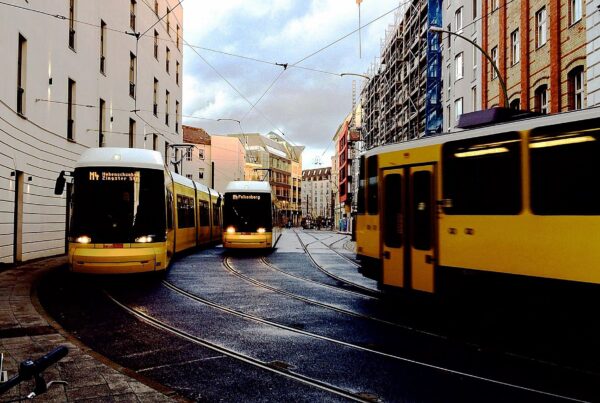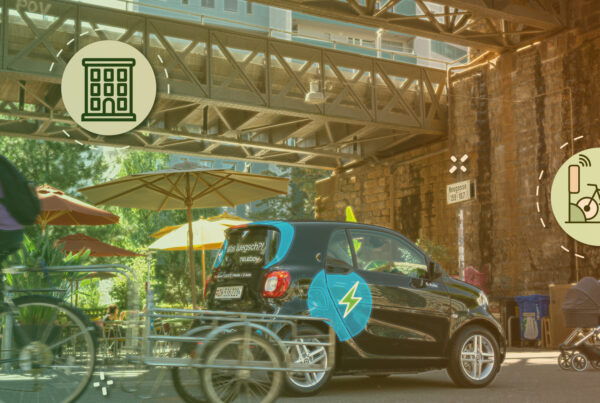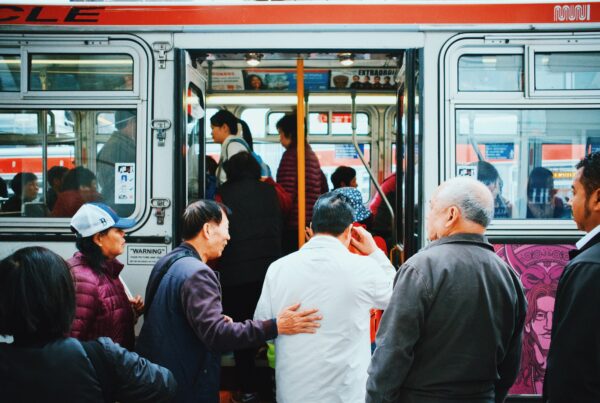The Mobility Hub
Your weekly guide to the latest in shared mobility
SUMC News and Announcements
You’re invited to a 75-minute webinar that explores “The Most Important Mile: Inclusive Futures for Local Delivery.” You will meet authors Dr. Anthony Townsend and Bryan Boyer, who will discuss their report, then take part in a panel discussion focusing on how autonomous vehicles impact society and individuals. Shared-Use Mobility Center CEO Benjie de la Peña will moderate. Don’t miss it!
Join us on December 9 for the first Mobility Data Interoperability Principles town hall | 11 AM – 12:30 PM PST
The Mobility Data Interoperability Principles (MDIP) are an ambitious effort to accelerate the implementation, adoption, and creation of open standards for mobility data by bringing together mobility service providers, transit agencies, technology companies, research institutions, DOTs—and the public. SUMC is one of the co-authors.
This town hall is designed to answer common questions about MDIP and to discuss near-term actions that can be taken to achieve the vision of interoperability throughout the transit industry. The session is free and open to attend. Register here.
Can you handle one more invite? It’s worth it.
CoMoUK is holding the Shared Transport Conference on December 7 & 8
The virtual event, which is free to attend, will look at shared mobility and transport and how they interact with the need for green recovery; decarbonization; the built environment, and health. Sign up here.
Mobility Justice
A Community Hub for Smart Mobility in Austin, TX, is advancing to stage 2 of the National Science Foundation’s Civic Innovation Challenge, bringing greater transportation equity along with it and providing a framework applicable to transit agencies across the U.S.
When transit is underfunded, derailment and delays occur, jeopardizing the livelihoods of underserved communities that use trains and buses the most—snowballing to yet more inequity.
The injustices of the digital divide deepened as a result of COVID-19, proving that “technology is an essential service.” Appropriately, Smart cities like Dallas and Boston are looking towards data to show gaps and how technology and transportation can better serve everyone.
Ridehailing/Carsharing/Carpooling
Making smart choices, using shared mobility, and getting rewarded for it? Sign us up. Uber is partnering with Colorado’s Department of Transportation to give riders a $15 credit when using the service during the holidays to keep the roads safe from impaired driving.
In landmark ridehail news, Lyft and Motional announced plans to launch a driverless public ridehail service in Las Vegas in 2023. The fleet will be comprised of Motional’s all-electric Hyundai IONIQ 5-based robotaxi.
When school buses stopped showing up, community members stepped up and turned to a basic form of shared mobility: carpooling. Even with these temporary solutions, districts are scrambling to fill the bus driver shortage across the country.
Bikesharing & Micromobility
Which one of you wrote this opinion piece for the New York Times? (Kidding) The article offers up, “why can’t everyone get a free e-bike?” With the positives outweighing the negatives and the budget being reasonable, free e-bikes for all could be the planet’s saving grace.
A new study shows that bike activity is up 10% in 2021 compared to 2019. And it’s not coming from big cities—midsize cities like Little Rock, Arkansas, and Jackson, Mississippi had gains of 50% or more, and the future looks bright to continue the trend.
The USDOT’s RAISE grant program is opting to fund car-free transportation over new roads and wider highways. In fact, 85% of the $1 billion grants will go to active transportation infrastructure, transit, and railway improvements.
E-scooters have been on Windy City streets for five years now and have filled gaps in transportation deserts. However, safe infrastructure and environmentally friendly production still need to be addressed.
Transit
Addressing safety on Chicago’s ‘L’, explains Streetsblog, will take much more than increasing law enforcement on trains and stations. Comprehensive solutions aimed at helping people experiencing homelessness, including unarmed ambassadors, and setting up better fare evasion policies, would be more effective than relying on police or other inherently-violent institutions.
The PATH to College Act, a provision led by Members of Congress from Pennsylvania, set priorities for college students to have better access to public transit services, and now the Build Back Better Act is including a similar package that would make higher education institutions eligible.
Over on the healthcare transportation front, a new study shows how the opening of Metro Transit’s Green line in the Twin Cities in 2014 led to “a meaningful reduction in the number of no-show appointments among patients”, by as much as 4.5% for all patients and up to 9.5% for Medicaid recipients.
Not all public transportation is seeing such positive action. London’s Underground is facing a £1.9 funding shortfall, and Mayor Sadiq Khan warns that this could cause Transport for London to shut down one of the system’s lines, with possible bus route disruptions too.
Technology
Accessibility tech company WeWALK, famous for its smart cane product, has announced a collaboration with Moovit to use Moovit’s intelligent software and data integrations to give people with visual impairments a better urban navigation and transportation experience using WeWALK’s smart cane.
Since range anxiety for electric vehicles contributes to the US’s low sales numbers (currently at 4%), universities and DOTs are rallying around wireless inductive charging, which embeds charging technology into the highway itself without using stations.
Looking at the driverless scene, the Darwin Innovation Group just started trials for its autonomous shuttle program to keep people moving around the Harwell Science and Innovation Campus in Oxfordshire—using satellite communications in place of Wi-Fi to test rural or remote area operation.
Sustainability
A shortage of oil worldwide has led to higher-than-normal gas prices, so President Biden has authorized the release of 50 million gallons of emergency reserves (part of a joint effort with other nations) to lower costs. Contrary to his climate-focused agenda, this action will only exacerbate our climate crisis and keep emissions high.
Cities across the US are creating resiliency plans to withstand current and forthcoming environmental disasters that result from climate change. While infrastructure planning for bridges and roads can save drenched and stranded communities, CO2 levels need to be cut drastically to prevent the problem from worsening.
In Chicago, a widening project slated for the Eisenhower Expressway will further drive the disastrous effects of car-centric transportation planning in the region, potentially raising, not lowering, CO2 levels for decades to come.
Project Funding Opportunities
RFP: Pace ADA Rideshare Pilot
Pace (Regional Transportation Authority)
Chicago, IL
Deadline: December 13
Fixed Route CAD/AVL and Route Planning Intelligent Transportation System
Bay Area Transportation Authority (BATA)
Grand Traverse and Leelanau Counties, MI
Deadline: December 24
Paratransit / Micro-transit CAD/AVL and Scheduling Intelligent Transportation System
Bay Area Transportation Authority (BATA)
Grand Traverse and Leelanau Counties, MI
December 24
RFP: Yonkers Shared Active Transportation (YSATN) Bike Share System
City of Yonkers
Yonkers, NY
Deadline: May 10, 2025
Bonus! Populus: Marketing and Communications Manager
San Francisco, California
Rolling
Have a story for us? Let us know.






